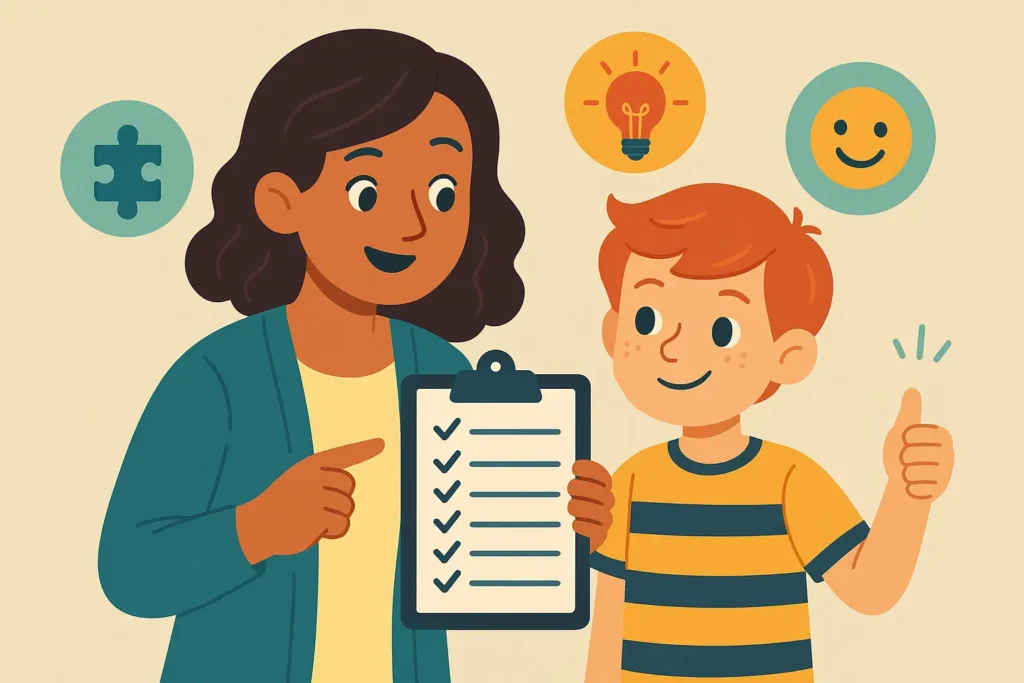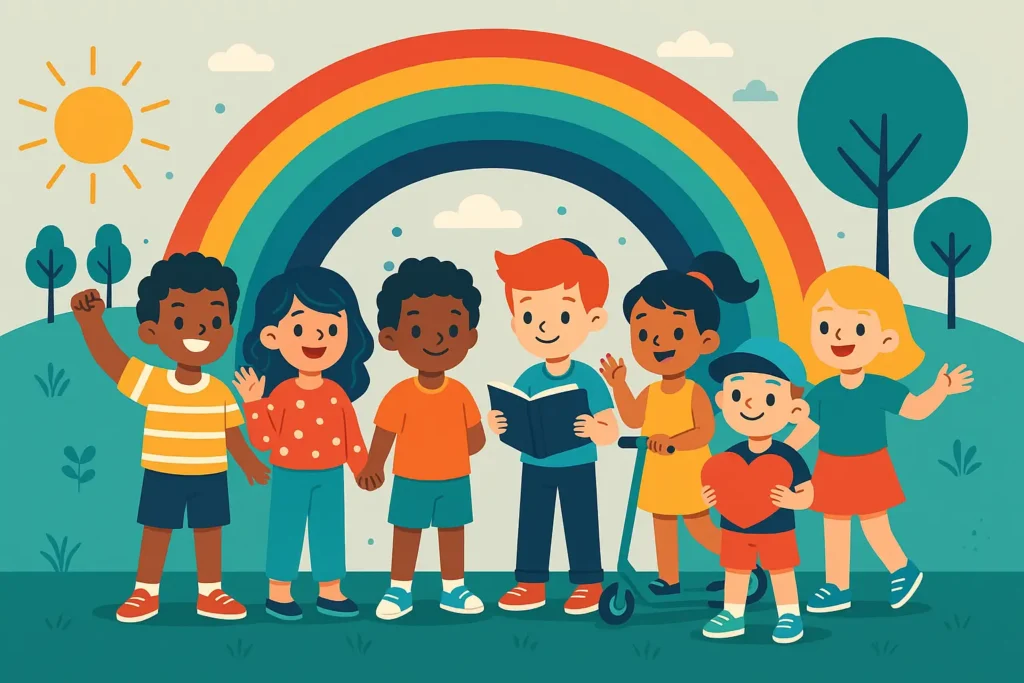In today’s distraction-filled world, helping children develop positive habits early in life has never been more important. The 7 habits of happy kids offer a framework that helps parents and educators nurture well-adjusted, confident, and emotionally intelligent children. These habits don’t just contribute to happiness in childhood—they establish essential life skills that create momentum for future success and fulfillment.
When children develop these foundational habits early, they gain an incredible advantage—one that compounds over time as these small, daily actions transform into character traits that shape their entire future. Much like planting seeds in fertile soil, cultivating these 7 habits for kids creates roots that support lifelong growth and development.
In this guide, you’ll discover:
- How to identify which of the 7 habits your unique child needs to develop most, based on their personality, interests, and current challenges
- Practical, age-appropriate strategies to make these powerful habits stick without battles or resistance
- AI-powered tools to personalize the habit-building journey and create a system that grows with your child over time
Why Childhood Habits Matter More Than Ever
Today’s children face unique challenges that previous generations didn’t encounter. From digital distractions to information overload, kids need a stronger internal compass to navigate an increasingly complex world. The concept of the 7 habits of happy kids draws inspiration from Stephen Covey’s acclaimed “7 Habits of Highly Effective People,” adapted to be accessible and relevant for children at their developmental stage.
Research consistently shows that children who develop positive habits early in life are more likely to become well-adjusted adults with higher levels of emotional intelligence, resilience, and social competence. These 7 healthy habits for kids encompass a holistic approach to child development, addressing mindset, social skills, responsibility, and personal effectiveness—creating a ripple effect that touches every aspect of their lives.
Read More: How to break bad Habits
What Are the 7 Habits of Happy Kids?
Let’s explore each of the 7 habits for kids in detail and understand how they contribute to children’s overall well-being and success. Each habit builds upon the previous one, creating a foundation of skills that work together to help children thrive:
Habit 1: Be Proactive – “I’m in Charge of Me”
The first of the 7 habits for kids teaches children to take responsibility for their choices and actions. Rather than blaming others or circumstances, proactive children understand that they have the power to choose their responses to situations.
Practical applications:
- Encouraging children to use “I” statements instead of blaming others
- Teaching kids to focus on what they can control (their circle of influence)
- Helping children understand the connection between choices and consequences
- Creating a “pause button” technique for responding thoughtfully rather than reacting impulsively
Habit 2: Begin with the End in Mind – “Have a Plan”
This habit helps children develop vision and purpose. By teaching kids to set goals and plan ahead, parents help them develop focus and determination—essential qualities for achieving anything meaningful in life.
Implementation strategies:
- Creating vision boards that visualize their goals and dreams
- Setting age-appropriate goals that challenge but don’t overwhelm
- Breaking larger goals into smaller, achievable steps
- Celebrating achievements and learning from setbacks as equally valuable experiences
Habit 3: Put First Things First – “Work First, Then Play”
The third of the 7 healthy habits for kids focuses on prioritization and self-discipline. Children learn to manage their time effectively, complete responsibilities before indulging in leisure activities, and develop the critical skill of delayed gratification.
Ways to foster this habit:
- Using visual schedules and consistent daily routines
- Implementing designated homework/chore times before screen time
- Teaching basic time management skills through analog clocks and timers
- Creating simple planning tools appropriate for their age
Habit 4: Think Win-Win – “Everyone Can Win”
This habit centers on developing a collaborative mindset. Children learn to find solutions that benefit everyone involved, fostering fairness and reciprocity in relationships—crucial skills for building healthy connections throughout life.
How to encourage this mindset:
- Modeling compromise and cooperation in everyday family decisions
- Playing collaborative games rather than just competitive ones
- Recognizing and praising instances of sharing and consideration
- Problem-solving together when conflicts arise
Read our blog on Abundance vs Scarcity Mindset
Habit 5: Seek First to Understand, Then to Be Understood – “Listen Before You Talk”
Among the 7 habits of healthy kids, this one focuses on developing empathy and communication skills. Children learn to listen attentively to others before expressing their own ideas and feelings, building deeper connections and reducing conflicts.
Activities to develop this habit:
- Practicing active listening exercises where children repeat back what they heard
- Role-playing different perspectives in common conflict scenarios
- Reading books that highlight diverse viewpoints and experiences
- Creating “talking stick” or similar objects that designate when it’s someone’s turn to speak
Habit 6: Synergize – “Together Is Better”
This habit teaches children the value of teamwork and collaboration. Children learn that by combining their strengths with others, they can achieve more than they could individually—an essential mindset for success in our interconnected world.
Ways to promote synergy:
- Engaging in family projects where everyone contributes their unique talents
- Participating in team sports or group creative activities
- Assigning collaborative chores that require working together
- Celebrating collective achievements as enthusiastically as individual ones
Habit 7: Sharpen the Saw – “Balance Feels Best”
The final of the seven habits of happy kids emphasizes self-renewal and balance. Children learn to take care of their body, mind, heart, and spirit through regular, balanced activities that recharge their batteries and prevent burnout.
Activities for renewal:
- Physical: Regular outdoor play, sports, dance, or other physical activities
- Mental: Reading, puzzles, learning new skills, and creative activities
- Emotional: Quality time with loved ones, expressing feelings appropriately
- Spiritual: Mindfulness practices, nature appreciation, gratitude exercises, or religious activities if relevant to your family
Read More: 100 Things to Be Grateful For
Personalizing the 7 Habits for Your Unique Child
While these 7 habits of happy kids provide an excellent framework, every child has unique strengths, challenges, and personality traits. The most effective approach is one that’s tailored to your specific child’s needs and temperament.

AI-Powered Habit Assessment for Your Child
You can use AI to help identify which habits might need the most attention for your child and how to customize your approach. Here’s a prompt you can copy and paste into ChatGPT, Claude, or other AI assistants:
AI PROMPT TO COPY/PASTE:
“I’m looking to help my child develop the 7 habits of happy kids (Be Proactive, Begin with End in Mind, Put First Things First, Think Win-Win, Seek First to Understand, Synergize, and Sharpen the Saw). Please act as a child development specialist to help me identify which habits to prioritize based on my child’s unique traits.
Please guide me through this process step by step, waiting for my response before moving to each next stage:
Step 1: Understanding your child’s current strengths and challenges
- How old is your child, and what are their main interests or passions? a. Example: “My daughter is 8 and loves art, animals, and playing with friends.”
- What are 2-3 strengths you’ve noticed in your child’s personality or behavior? a. Example: “She’s very creative and empathetic toward others.”
- What are 2-3 challenges your child currently faces in terms of behavior or mindset? a. Example: “She gets easily frustrated when things don’t go perfectly and has trouble completing tasks before moving to something more fun.”
Step 2: Assessing current habit development
- Which of the 7 habits do you think your child already shows some strength in? a. Example: “She’s good at thinking win-win and understanding others’ feelings.”
- Which habits seem most challenging for your child right now? a. Example: “Being proactive instead of reactive and putting first things first.”
- In what situations do you notice these challenges most frequently? a. Example: “Homework time and when plans change unexpectedly.”
Step 3: Environment and implementation factors
- What’s your family schedule like? Are there consistent routines or is it more variable?
- What motivates your child most effectively? (Praise, privileges, quality time, etc.)
- Are there other family members or caregivers who would be involved in helping develop these habits?”
Customizing Implementation Strategies
Once you understand which habits need the most attention, you can create personalized strategies that work with your child’s natural tendencies rather than against them. Here’s another helpful AI prompt to develop tailored implementation approaches:
AI PROMPT TO COPY/PASTE:
“I’m working on helping my child develop the habit of [specific habit from the 7 habits]. Please act as a parenting coach to help me create personalized strategies based on my child’s unique traits.
Please guide me through this process step by step, waiting for my response before moving to each next stage:
Step 1: Habit-specific assessment
- What specific behaviors would show that your child is developing this habit successfully? a. Example: “For ‘Put First Things First,’ completing homework before video games.”
- What situations trigger challenges with this particular habit? a. Example: “When friends are over or when a new game is available.”
- Has your child shown any interest or success with this habit in specific contexts? a. Example: “He’s good at prioritizing when it comes to his LEGO projects.”
Step 2: Personalization factors
- What are your child’s favorite activities, characters, or themes? a. Example: “Space, superheroes, and building things.”
- How does your child prefer to learn? (Visual, hands-on, through stories, etc.) a. Example: “He learns best through hands-on activities and visual demonstrations.”
- What reward systems or recognition have worked well in the past? a. Example: “Chart systems with small rewards for milestones and lots of specific praise.”
Step 3: Implementation environment
- Where and when would be the best opportunities to practice this habit?
- Who could be positive influences or role models for this specific habit?
- What potential obstacles might make it difficult to consistently practice this habit?”
Implementing the 7 Habits for Kids in Daily Life
Transforming these concepts into daily practices requires consistent effort, creativity, and the right approach. Here are effective strategies for integrating the 7 habits of happy kids into everyday routines:
Create a Supportive Environment
The physical environment plays a crucial role in habit formation. Design spaces that support focus, organization, and creativity. Make the habits visually obvious with age-appropriate reminders like posters, charts, or symbols around your home. Create designated areas for different activities—study spaces, reading corners, and creative zones.
Consider how you can remove friction from positive habits while adding friction to negative ones. For example, keep books visible and accessible while storing electronic devices out of sight when it’s time for reading.
Make the Habits Easy and Achievable
Start small by breaking habits into tiny, manageable actions that feel almost too easy to fail. For young children, begin with simple applications of each habit that can be completed in minutes, not hours. As confidence builds, gradually increase the complexity.
For example, to build Habit 3 (Put First Things First), begin with having your child complete just one small responsibility before play. Celebrate this win, then gradually extend the approach to other responsibilities.
Make Learning the Habits Fun and Rewarding
Children learn best through play and positive association. Turn habit development into games, challenges, and adventures rather than chores. Create characters that represent each habit, design scavenger hunts that reinforce the concepts, or develop a points system that makes progress visual and exciting.
The emotional experience associated with these habits will determine whether they stick. When children experience joy, pride, and accomplishment while practicing these habits, they’ll naturally want to repeat them.
Read More: How to Take Action
Model the Behaviors Consistently
Children learn primarily through observation. Parents and educators who demonstrate these healthy habits for kids in their own lives provide powerful examples that children naturally emulate. Be transparent about your own habit development journey—when children see you working on these same skills, it normalizes the growth process.
When you make mistakes (and we all do), use them as teaching opportunities by acknowledging them and demonstrating how to respond proactively.
Create Positive Feedback Loops
Establish a system of recognition that helps children connect their new habits with positive outcomes. This doesn’t mean material rewards for every action, but rather helping them notice and celebrate the natural benefits that come from practicing these habits.
For example, when your child resolves a conflict using win-win thinking, point out how much happier everyone feels afterward. This helps them associate the habit with positive emotions, strengthening their intrinsic motivation.
Build Momentum Through Consistency
The power of habits comes through consistent repetition. Create regular routines that incorporate these principles daily, weekly, and monthly. For instance:
- Daily: Morning routine that includes planning the day (Habit 2)
- Weekly: Family meetings that practice listening skills (Habit 5)
- Monthly: Reflection on progress and goal-setting sessions (Habits 1 and 7)
As your child experiences small wins in developing these habits, they’ll build momentum that makes further growth increasingly natural and self-sustaining.
Read More: How to be consistent and disciplined
The Ripple Effect: How These 7 Habits Transform Children’s Lives
The benefits of incorporating the 7 habits of happy kids extend far beyond childhood. These foundational principles create a positive ripple effect that touches every aspect of their development, preparing children for future challenges by building:
Mindset Transformation
Children who master these habits develop what psychologists call a “growth owner mindset”—the belief that they can improve through effort and that they own the results of their choices. This mindset is consistently linked to higher achievement, better stress management, and greater life satisfaction.
Research from Stanford University shows that children with this mindset are more likely to:
- Embrace challenges rather than avoid them
- Persist in the face of setbacks
- See effort as a path to mastery
- Learn from criticism rather than ignoring it
- Find inspiration in others’ success instead of feeling threatened
Emotional Intelligence and Relationship Skills
The 7 habits of healthy kids build crucial emotional intelligence skills that predict success in relationships throughout life. Children learn to:
- Recognize and manage their emotions effectively
- Understand others’ perspectives and feelings
- Communicate their needs assertively but respectfully
- Resolve conflicts collaboratively
- Build meaningful connections with peers and adults
These skills create a foundation for healthy relationships in all contexts—from family interactions to friendships, and eventually to professional and romantic relationships.
Academic and Career Readiness
While not explicitly academic, these habits create the conditions for learning and achievement. A 10-year study published in the American Journal of Public Health found that social-emotional skills in kindergarten (many of which are developed through these habits) predicted key adult outcomes including:
- Higher educational attainment
- Stable employment
- Better mental health
- Reduced criminal activity
The self-management, goal-setting, and collaboration skills embedded in the 7 habits for kids are precisely the qualities that educators and employers consistently identify as critical for success in the 21st century.
Physical and Mental Wellbeing
Habit 7 (Sharpen the Saw) directly addresses balanced self-care, but all the habits contribute to better physical and mental health. Children who develop these skills show:
- Lower rates of anxiety and depression
- Better stress management
- Healthier lifestyle choices
- Greater resilience when facing challenges
- Higher overall life satisfaction
In a world where childhood mental health concerns are rising, these preventative habits provide a powerful protective effect.
Balancing All Life Areas
Perhaps most importantly, these seven habits of happy kids help children develop balance across all important areas of life—from academic achievement to relationships, physical health to emotional wellbeing. This holistic approach ensures that children don’t excel in one domain at the expense of others, creating a solid foundation for lifelong fulfillment.
As children mature, the habits mature with them, becoming more sophisticated in their application while retaining their fundamental principles. The investment in developing these habits during childhood yields compounding returns throughout life and helps in finding balance in life.
From Habits to Life Skills: The Journey to Happiness and Success
The 7 habits of happy kids provide a comprehensive framework for raising children who are not only happy in the moment but equipped with essential life skills for long-term success and fulfillment. By intentionally incorporating these habits into daily routines, parents and educators can help children develop the character and capabilities that will serve them throughout their lives.
Remember that habit formation is a journey, not a destination. The process requires patience, consistency, and a focus on progress rather than perfection. Every small step your child takes in developing these habits creates momentum that builds over time, eventually transforming conscious efforts into automatic behaviors that shape their character.
As you support your child in developing these habits, you’re giving them much more than just behavioral tools. You’re helping them build an internal compass that will guide their decisions and actions long after they’ve left your daily care.
Taking Your Child’s Habit Development to the Next Level
While the strategies and AI prompts in this article offer a solid starting point for implementing the 7 habits of happy kids, many parents find that a more comprehensive, structured system helps maintain momentum and overcome the inevitable challenges in the habit formation journey.
The AI Habits Coach offers a science-based, gamified approach that makes developing these crucial habits simple, fun, and rewarding for children. By combining behavioral science with personalization and engaging game elements, this system helps children transform the sometimes challenging work of habit development into an exciting adventure.
The system’s approach mirrors what we’ve discussed—identifying key habits, personalizing implementation strategies, and creating the conditions that make positive habits inevitable—but adds powerful technological tools, AI-driven personalization, and a motivating framework that keeps children engaged in their growth journey.
By understanding and implementing what are the 7 habits of happy kids, you’re giving your children one of the greatest gifts possible: the foundation for a life of purpose, connection, achievement, and joy.






